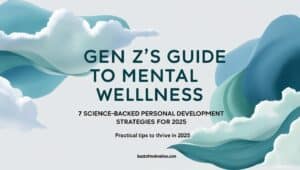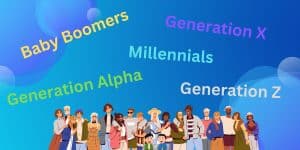Generation Z (Gen Z), born between 1997 and 2012, is transforming industries, workplaces, and consumer behavior. As digital natives, they are the first generation to grow up entirely with the internet, social media, and smartphones. They value authenticity, financial security, diversity, and mental health awareness.

In this data-driven guide, we explore Gen Z’s defining personality traits, workplace behaviors, and what businesses must do to attract and retain them—all backed by verified statistics and credible sources.
Key Traits of Gen Z (With Verified Statistics & Sources)
Digital Natives
Gen Z has never known a world without the internet, smartphones, and social media. They consume content through short videos, messaging apps, and digital platforms.
- 95% of Gen Z own a smartphone, and nearly 46% are online almost constantly.
- 98% of Gen Z use social media daily.
Impact:
- Brands must prioritize mobile-friendly experiences and social-first marketing.
- Short-form video content (TikTok, Instagram Reels, YouTube Shorts) is essential.
The Most Diverse Generation
Gen Z is the most racially and ethnically diverse generation in history. They expect inclusivity and representation in brands, workplaces, and leadership.
- 52% of Gen Z identify as non-Hispanic White, compared to 61% of Millennials in 2002.
- 22% of Gen Z have at least one immigrant parent, compared to 14% of Millennials.
Impact:
- Companies must prioritize Diversity, Equity, and Inclusion (DEI) initiatives.
- Gen Z expects authentic representation in advertising and workplace leadership.
Financially Cautious and Career-Focused
Unlike previous generations, Gen Z prioritizes financial security over passion-driven careers. They witnessed economic recessions and rising student debt, making them more financially conservative.
- 68% of Gen Z prefer a secure, high-paying job over one that aligns with their passion.
- 70% of Gen Zers are already saving money, and 57% have side hustles.
Impact:
- Employers must offer competitive salaries, stability, and clear career growth opportunities.
- Financial literacy programs appeal to Gen Z employees and customers.
Mental Health Awareness
Gen Z is highly vocal about mental health, prioritizing well-being over traditional career or financial goals. They expect mental health support in workplaces, education, and social settings.
- 91% of Gen Z have experienced at least one mental health symptom, such as stress or anxiety.
- 70% of Gen Z believe mental health is more important than salary in a job.
Source: American Psychological Association
Impact:
- Mental health benefits (therapy, mindfulness programs, work-life balance) are a must in the workplace.
- Brands that promote mental well-being and self-care resonate deeply with Gen Z.
Entrepreneurial and Side Hustle-Oriented
Gen Z is the most entrepreneurial generation, valuing independence and multiple income streams over traditional corporate structures.
- 62% of Gen Z plan to start their own business rather than work a 9-5 job.
- 45% already earn money through freelancing, influencer marketing, or e-commerce.
Impact:
- Employers must offer freelance-friendly work models, remote work, and innovation opportunities.
- Business tools and e-learning platforms are highly appealing to Gen Z consumers.
Gen Z in the Workplace (With Verified Data & Sources)
They Demand Work Flexibility
Gen Z prefers remote or hybrid work environments, rejecting the traditional office culture of previous generations.
- 73% of Gen Z employees prefer remote or hybrid work.
- Only 16% of Gen Z want to work in an office full-time.
Impact:
- Remote work options and flexible schedules are non-negotiable.
- Employers must invest in digital collaboration tools and asynchronous workflows.
They Prioritize Purpose-Driven Companies
Gen Z aligns with brands and employers that stand for social causes, sustainability, and ethical business practices.
- 77% of Gen Z say they will only work for companies that align with their values.
- 60% of Gen Z boycott brands that fail to support social causes.
Impact:
- Companies must show commitment to sustainability, ethics, and diversity to attract Gen Z employees and consumers.
- Purpose-driven marketing is essential for brand loyalty.
They Expect Career Growth
Gen Z values continuous learning and professional development. They are more likely to leave a job if they feel stagnant.
- 76% of Gen Z say learning and development is crucial to career success.
- 63% prefer mentorship programs and professional coaching over traditional education.
Impact:
- Companies must invest in mentorship, training, and skill-building programs.
- Career progression opportunities are key to retaining Gen Z employees.
Mental Health Matters in the Workplace
Gen Z expects workplaces to support mental health through flexible schedules, mental health days, and employee wellness programs.
- 91% of Gen Z workers say mental health benefits are a top priority.
- 48% would leave a job if it negatively impacts their mental health.
Source: American Psychological Association
Impact:
- Companies need to prioritize employee well-being to attract and retain Gen Z talent.
- Mental health days and a supportive culture will become standard workplace expectations.
Key Takeaways
- Gen Z is digital-first, meaning brands must prioritize online, mobile-friendly experiences.
- They demand diversity, inclusion, and authentic representation from employers and brands.
- Financial security is a top concern, leading to cautious spending and increased savings.
- Mental health awareness is non-negotiable, with a strong preference for workplaces that offer support.
- Career growth, flexibility, and purpose-driven work environments are essential to keeping Gen Z engaged.
Final Thoughts
Gen Z is reshaping industries, consumer trends, and the workplace. Employers, brands, and businesses that align with their values and expectations will thrive. Understanding their priorities—such as flexibility, financial stability, diversity, and mental health—will be the key to successfully engaging this generation.
Read Next:
→ How to Know What Letter Your Generation Is A guide to understanding different generations
→ Online Dating for Gen Z: Tips for Safety and Success Essential insights into modern dating for the digital generation.
→ Breaking Free from Limiting Beliefs Discover how to overcome mental barriers and unlock your full potential.











